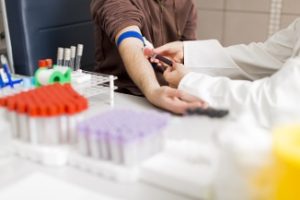If you were arrested for DWI following a blood test you might think your conviction is a sure thing.
This is not true.
A blood test, though it seems like air tight evidence of your guilt, can be challenged by your attorney.
In this blog I’ll outline the law police must follow when obtaining your blood and ways your attorney can challenge the prosecution’s charges.
One of the protections our constitution affords us as Americans is the protection from the invasion of our privacy by the government and police. Thanks to our freedoms, we take for granted that our homes are private sanctuaries where the government is restrained from barging in or listening to our private conversations. The same is true for our bodies.
You can’t just take somebody’s blood. This is America and that’s your DNA.
In order for a blood test to be admissible in court, police must follow strict protocol.
- You must give your consent in order for blood to be taken.
- Police are only allowed to order a blood test if they have a search warrant.
- Tests must be performed by a hospital professional.
Blood tests are administered for two reasons:
- To get a diagnosis
- To gather evidence
The law says police can’t use the results of diagnostic tests in court. Police can only use the results of blood that is obtained for purposes of evidence.
In the past police could get a blood test without a search warrant if it was an emergency. Say the individual in question was badly injured after hitting a telephone pole at 2:15 a.m. and rushed to the hospital. In order to get an accurate blood alcohol level at the time of the accident police would need to take the blood sample immediately before the individual’s body metabolized the alcohol. Until recently, there wasn’t time to get ahold of the prosecutor and a judge in the middle of the night.
But thanks to the 24 hour connectivity of mobile phones, a judge on call can easily be reached (just like a doctor) to review a request for search and grant a warrant.
If police do get their warrant there are still legal requirements to be followed.
Here are just a few:
- The police officer must be under oath during a call for a search warrant.
- A special sealed blood kit must be used.
- The test must be performed by a medical professional.
- The sample must be sealed and driven to state police lab.
- The proper chain of custody of the sample must be preserved.
- The sample must be stored in the evidential fridge.
If any of these steps are skipped or performed improperly, the test becomes potentially inadmissible.
But what about hospital records? Can’t the prosecution use the hospital’s blood samples?
No.
I had one case where the state issued a subpoena after the fact to use hospital blood tests, but I was able to get this evidence thrown out because the blood was drawn for diagnosis, not evidence. This is a good example of why no one should go into a DWI defense unrepresented.
I often find that when clients first come to me they don’t know their rights concerning DWI arrests and blood tests. Their initial assumption is that there’s nothing they can do but go to court and face the charges. But the Constitution protects you as a private citizen. Your DWI lawyer should make sure that in the process of your arrest your rights weren’t violated.
If your case involves a blood sample don’t assume that the sample is accurate or that it will hold up in court. An attorney with experience in this area will take an aggressive approach to determine if proper protocol was followed and that there is a factual basis to support the state’s claims against you. This is critical to your case, especially if you are facing the high stakes of a job loss or jail time for a third offense.
